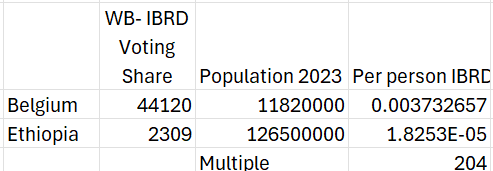Buying green is good sometimes. Not buying at all is better most of the time.
I want to state the obvious.
Alphabet's Q4 2024 net income was 100 billion dollars, but that's not enough for 2025. Alphabet needs to increase their profits for 2025, because the shareholders demand a constant increase in share price.
Alphabet not only has to maintain their already stupendous profits in 2025 Q1, but find even more.
It's hopelessly naive to think a corporation like this would not seek profits from unethical business at the latest when they can't squeeze more from ethical ones.
There's no other field than #AI where people don't bat an eye about the fact that their new #LLM toy has China's censorship baked in.
When it's all immoral, one more immoral thing doesn't change anything.
A Belgian citizen has 204 more voting power in the #WorldBank than an Ethiopian citizen.
The #WorldBank and #IMF are unjust, Apartheid institutions that need to be restructured.
November has been rough for me. Terrible international news, stress at work and almost no sunlight in Helsinki has been a lot handle.
Then I got ill but tried to get back to work too early, and it was all too much.
I've now had to block all news and social media from Thu to Sun with the great Freedom.to app (the only SaaS I pay for). It has helped, and I've for example read a lot of fiction again.
Unfortunately, it means less time on Mastodon. But I'm still here!
P.s. Hello new followers!
@jonne Jep, lähinnä meinasin että tuon takia moinen 6km matka unohdetaan mainita.
Näemmä yhä kaupunkipyöräehdotukset torpataan valtuustoissa, etteivät vahingossakaan pääse ulkopaikkakuntalaiset testaamaan Oulun erinomaisia pyöräteitä.
@jonne Sinne pääsee pyörällä hetkessä, talavellaki!
